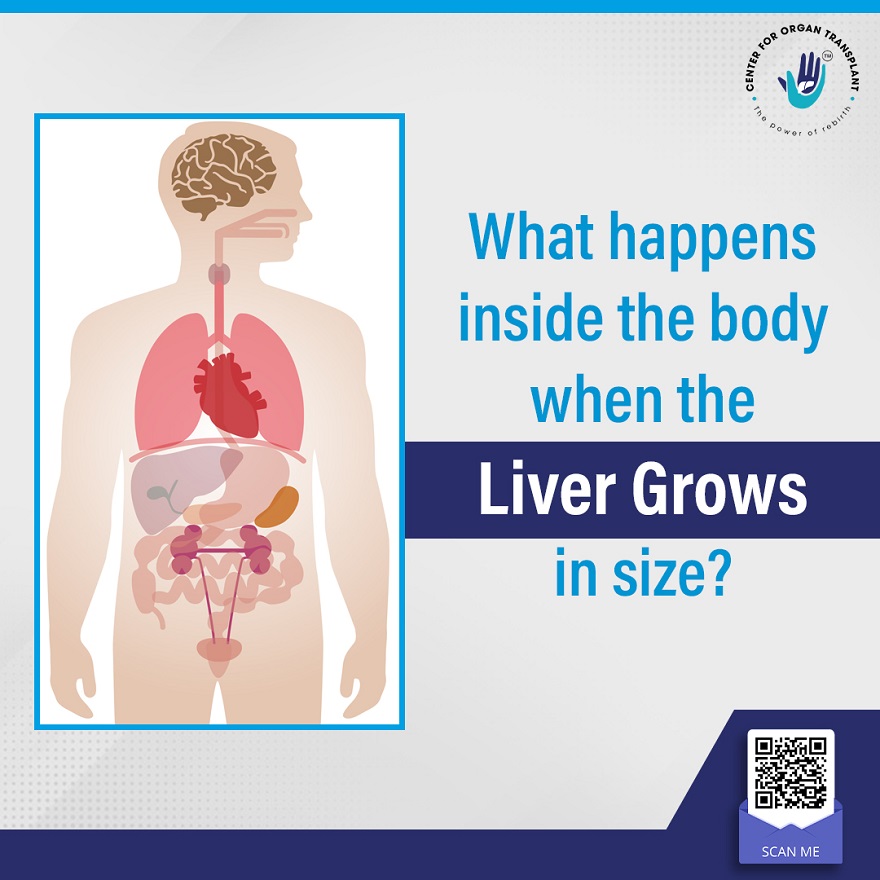Pravin Patole (Transplant Year: 2021)
Treatment : Liver Transplant
Saket Khadakkar (Transplant Year: 2021)
Treatment : Liver Transplant
Pravin Patole (Transplant Year: 2021)
Treatment : Liver Transplant
Saket Khadakkar (Transplant Year: 2021)
Treatment : Liver Transplant
Pravin Patole (Transplant Year: 2021)
Treatment : Liver Transplant
Saket Khadakkar (Transplant Year: 2021)
Treatment : Liver Transplant
Error: Contact form not found.

The liver is an essential organ in the body’s many activities. The average size of a woman’s liver is 7 cm, whereas a man’s liver is 10.5 cm. It’s considered abnormal if the liver spreads 2 to 3 cm more or less than these levels.
An enlarged liver, also known as hepatomegaly, is swollen beyond its average size for any reason.
Rather than a disease, an enlarged liver is a sign of an underlying problem, such as liver disease, congestive heart failure, or cancer. Treatment involves identifying and controlling the cause of the condition.
The liver can expand due to a variety of diseases or disorders. An enlarged liver can occur in certain persons due to taking too many toxins, such as alcohol, drugs like acetaminophen (Tylenol), or vitamins. Cirrhosis (liver scarring) can be caused by long-term exposure to high amounts of harmful chemicals (including alcohol), drugs, or supplements.
The following diseases and medical situations might cause the liver to enlarge:
The majority of the time, an enlarged liver is asymptomatic. Doctors frequently identify it while treating a patient for a different, unrelated ailment.
If the underlying reason is primary liver disease, an enlarged liver may appear alongside other symptoms. These signs and symptoms could include:
How can you know if you have an enlarged liver?
A physical examination and imaging tests, such as a
It can help a doctor detect an enlarged liver. The doctor will most likely request specific blood tests to figure out what’s causing the liver enlargement. A liver biopsy may be required in some instances.
The cause determines the treatment for an enlarged liver. When liver enlargement is caused by fat accumulation in the liver or alcoholism, lifestyle adjustments can help. Lifestyle changes include:
Treatment for different types of liver enlargement is determined by the underlying condition.
Can you feel if your liver is swollen?
If your liver is somewhat enlarged, you probably won’t notice any symptoms. If it’s extremely swollen, you could be suffering from a feeling of fullness. You’re feeling uneasy in your stomach.
Is it possible to reverse an enlarged liver?
No treatment can reverse the fat build-up in your liver if you have NASH. In certain circumstances, liver damage can be stopped or even reversed. In some instances, however, the sickness is still progressing. Controlling any diseases that may contribute to fatty liver disease is critical if you have NASH.
What foods should you avoid if you have a swollen liver?
If you have fatty liver disease, there are six foods you should avoid.
Alcohol. Alcohol is a significant contributor to fatty liver disease and other liver illnesses.
One should avoid sugar and sugary foods such as candies, cookies, sodas, and fruit juices.
Deep-Fried food.
Salty food.
Pasta, white bread, and rice
Red Meat.
When should I call the doctor about symptoms of an enlarged liver?
Contact your doctor if you experience symptoms that could indicate an enlarged liver, such as upper abdominal pain, recurrent nausea, and vomiting, or jaundice.
Recent Comments